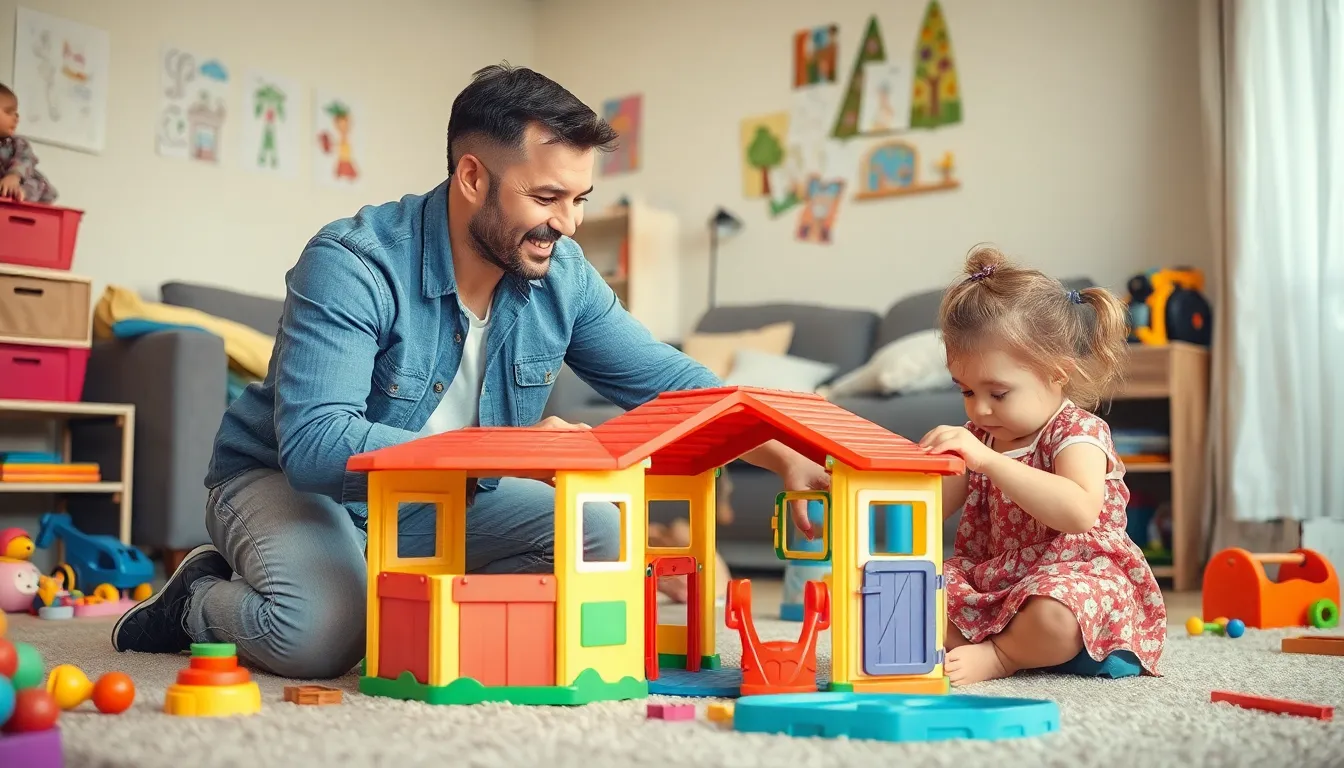Single moms often find themselves navigating a minefield of parenting myths that can leave them feeling confused and overwhelmed. From the belief that they can’t provide the same stability as two-parent households to the notion that their kids will inevitably be troublemakers, these misconceptions can be as persistent as a toddler’s tantrum in the cereal aisle.
But let’s be real—single moms are superheroes in disguise. They juggle work, school, and the occasional existential crisis while raising incredible kids who are just as likely to excel as any other. It’s time to debunk these myths and celebrate the unique strengths that single moms bring to the table. After all, who needs a sidekick when you’ve got the power of determination and a well-timed snack?
Table of Contents
ToggleCommon Parenting Myths About Single Moms
Various myths surround single moms, often undermining their abilities and contributions. Debunking these misconceptions can foster a more accurate understanding of their lived experiences.
Myth 1: Single Moms Aren’t Capable of Raising Successful Kids
Single moms possess strong skills in nurturing successful children. Research shows that over 50% of single-mother households produce high-achieving children with solid educational outcomes. Their resilience often leads to positive parental engagement, creating environments that support growth and learning. Success for children in these homes often arises from dedicated time spent on education and emotional support. Single mothers frequently demonstrate strong advocacy for their children’s needs, contributing to overall well-being.
Myth 2: Single Moms are Always Struggling Financially
Many believe single moms constantly face financial struggles, but this is often an oversimplified view. Data from the U.S. Census Bureau reveals that nearly 30% of single mothers earn incomes above the poverty line. Financial stability varies; some single moms balance work and childcare effectively, securing better resources for their families. They often prioritize budgeting and financial literacy, navigating challenges with creativity and determination. Moreover, single moms frequently access support networks, allowing them to thrive in various financial circumstances.
Impact of Parenting Myths on Single Moms

Parenting myths significantly affect single moms, influencing how they perceive their abilities. Emotional challenges arise when single mothers internalize beliefs that they cannot provide stability or that their children will misbehave. These misconceptions may lead to feelings of inadequacy, anxiety, and self-doubt.
Emotional and Psychological Effects
Emotional struggles often stem from unrealistic expectations linked to parenting myths. Mothers may experience stress as they strive to meet these societal standards. According to research, single moms display resilience and strong nurturing capabilities despite these pressures. Research indicates over 50% of children from single-mother households achieve success, demonstrating their effective parenting. With determination and positive reinforcement, single moms foster healthy self-esteem in their children.
Societal Perceptions and Stigma
Society often perpetuates stigma against single mothers, presenting them as overwhelmed and unable to thrive. Misbeliefs about financial struggles overshadow the reality that nearly 30% of single moms earn above the poverty line. When faced with negative stereotypes, many single moms work diligently to challenge perceptions and showcase their capabilities. Advocacy within communities becomes essential, as single mothers strive to redefine their roles and navigate societal expectations. By dismantling these myths, they create a stronger support network that promotes understanding and solidarity.
Strategies to Overcome Parenting Myths
Single moms can effectively combat parenting myths through robust strategies. Building a strong support network and emphasizing positive parenting practices play crucial roles in this process.
Building a Support Network
Creating a solid support network proves essential for single moms. Connecting with family, friends, and community resources enhances social interaction and reduces feelings of isolation. Participating in local single-parent support groups fosters a sense of belonging. Leveraging online communities also provides valuable insights and encouragement. These networks offer emotional support and practical advice, enabling single moms to share experiences and overcome challenges together. With 30% of single moms earning above the poverty line, financial exchanges within networks can also aid in robust budgeting strategies.
Emphasizing Positive Parenting Practices
Prioritizing positive parenting practices benefits both single moms and their children. Focusing on open communication cultivates trust and understanding. Setting clear expectations helps children grasp boundaries while nurturing their independence. Encouraging their children’s achievements, no matter how small, builds self-esteem and reinforces parental support. Single moms can model resilience, demonstrating how to navigate challenges effectively. Research shows high-achieving outcomes in over 50% of single-mother households, highlighting that parenting approaches significantly shape children’s success. Emphasizing love, respect, and consistency creates effective nurturing environments that contradict negative myths.
The Truth Behind the Myths
Single mothers often face misconceptions that undermine their parenting abilities. The first myth suggests single moms can’t provide the same stability as two-parent households; however, many single mothers create nurturing environments that foster success. Research shows over 50% of children raised by single moms achieve high levels of accomplishment, dispelling the notion that single parenthood equals failure.
Another prevalent myth points to financial struggles. Contrary to this belief, nearly 30% of single moms earn above the poverty line, demonstrating their financial resilience. These mothers prioritize budgeting and develop strong support networks, enabling them to balance work and childcare effectively.
The emotional impact of these myths is significant. Negative beliefs about single mothers can lead to feelings of inadequacy. Despite societal pressures, research indicates that single moms often cultivate resilience and promote healthy self-esteem in their children. Positive parenting practices play a crucial role in this process, illustrating how love and respect foster trust.
Additionally, stereotypes suggest single moms are overwhelmed and isolated. Many single mothers actively challenge these assumptions, advocating for themselves within their communities. Support groups and online platforms provide emotional backing, helping to reshape public perception of single motherhood.
Effective strategies help combat these myths. For instance, participating in community resources builds a sense of belonging. Open communication ensures children feel valued and understood, while setting clear expectations nurtures trust. Fostering achievements not only boosts self-esteem but also reinforces high outcomes seen in numerous single-mother households.
In essence, single mothers showcase strength, creativity, and determination, defying stereotypes and creating successful futures for their children.
Parenting myths about single moms often overshadow their remarkable capabilities. The resilience and dedication displayed by these mothers challenge societal stereotypes and prove that love and commitment are the cornerstones of successful parenting. By breaking down misconceptions and fostering supportive networks, single moms not only uplift their families but also pave the way for future generations.
It’s crucial to recognize the strength single mothers possess in navigating their unique challenges while nurturing high-achieving children. As they continue to redefine their roles, single moms inspire others and contribute to a more inclusive understanding of family dynamics. Embracing their journey empowers not just themselves but also their children, proving that success knows no family structure.







